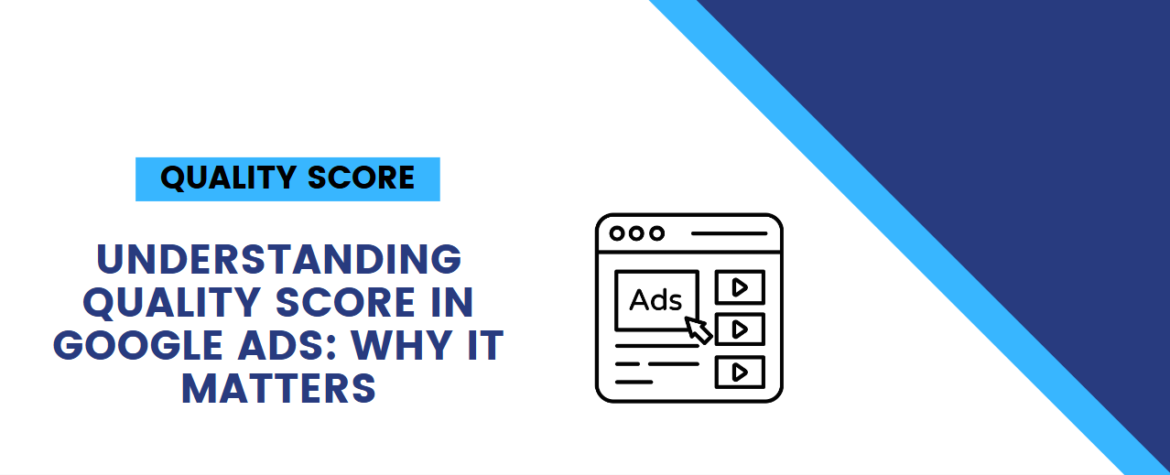If you’ve ever run a Google Ads campaign, you’ve likely heard of Quality Score. But what exactly is it, and why does it matter? Understanding this critical metric is essential for getting the most out of your Google Ads campaigns and ensuring you’re spending your budget efficiently.
In this blog post, we’ll dive into what Quality Score is, how it’s calculated, why it matters, and how you can improve it to get better results for your ads.
What is Quality Score?
Quality Score is a metric used by Google to measure the quality and relevance of your keywords, ads, and landing pages. Google uses this score to determine how well your ad matches a user’s search query and their overall experience on your website. It’s essentially Google’s way of evaluating the “quality” of your ad campaign and ensuring users are getting the most relevant and useful results.
The higher your Quality Score, the better your chances of having your ad appear higher in the search results—at a lower cost. Simply put, it’s a way for Google to reward advertisers who are providing value and relevance to users.
Quality Score is rated on a scale from 1 to 10, with 10 being the best. A score of 7 or higher is typically considered a good Quality Score, but aiming for 8 or 9 is ideal if you want to reduce your costs and improve your ad performance.
How Is Quality Score Calculated?
Google doesn’t disclose the exact formula for calculating Quality Score, but it’s known to be based on three main factors:
1. Expected Click-Through Rate (CTR)
CTR is one of the most significant factors that Google considers when calculating Quality Score. It’s the percentage of people who click your ad after seeing it. A high CTR suggests that users find your ad relevant and engaging.
Google takes into account how likely it is that people will click on your ad based on historical performance. If your ads tend to get clicked more frequently for certain keywords, your expected CTR will be high, boosting your Quality Score.
Stats: According to WordStream, the average CTR for Google Ads is around 3.17% for search ads. But ads with higher CTRs generally pay lower costs per click.
2. Ad Relevance
Ad relevance measures how well your ad matches the search query. For example, if someone searches for “best running shoes,” and your ad includes “best running shoes on sale,” it’s highly relevant and likely to get a good Quality Score.
If the keywords in your ad are closely aligned with the user’s search intent, it shows Google that you’re delivering relevant results. On the other hand, if there’s a mismatch between the keywords, ad copy, and the user’s query, your ad relevance will drop.
3. Landing Page Experience
Landing page experience is another critical factor. If a user clicks on your ad and lands on a page that doesn’t match the ad’s promise or is difficult to navigate, the user experience will suffer. Google considers the quality of your landing page in its Quality Score calculation.
Key elements of a good landing page include:
- Relevance: Your landing page should match the ad’s content and fulfill the user’s intent.
- User experience (UX): The page should be easy to navigate, mobile-friendly, and load quickly.
- Transparency and trustworthiness: Users should know exactly what they’re getting when they land on your page. If you promise a deal or a product, it should be front and center.
Stats: Google has reported that a slow-loading landing page can increase bounce rates by as much as 32% (compared to fast-loading pages). A good landing page helps reduce bounce rates and improves Quality Score.
Why Does Quality Score Matter?
Quality Score plays a crucial role in how Google Ads determines your ad rank and cost-per-click (CPC). Here’s why it matters:
1. Better Ad Position at Lower Cost
The most significant benefit of a higher Quality Score is that it can lead to a better ad position in the search results without increasing your bid. Essentially, Google rewards advertisers who offer relevant and high-quality ads by allowing them to pay less for better ad positions.
Ad rank is determined by your bid multiplied by your Quality Score. So, if your Quality Score is high, you can achieve a top ad position while spending less on each click. This is why many successful advertisers focus on improving Quality Score rather than just increasing their bids.
2. Lower Cost-Per-Click (CPC)
When your Quality Score is high, Google sees you as a more relevant and trustworthy advertiser, which can lower your CPC. With a lower CPC, your advertising budget goes further, meaning you can drive more traffic and conversions without spending more money.
Stats: According to Google, advertisers with a higher Quality Score can pay 50% less per click than those with a lower score, while still achieving better ad placements.
3. Improved Return on Investment (ROI)
Since a higher Quality Score leads to better ad positions at a lower cost, your overall ROI improves. You’ll get more clicks for less money, which means you’re maximizing the effectiveness of your ad spend. The more relevant and high-quality your ads are, the better the return on your investment.
How to Improve Your Quality Score
Now that we know why Quality Score is so important, let’s explore practical ways to improve it.
1. Improve Your Ad Copy
Your ad copy should be directly relevant to the keywords you’re targeting. The more closely aligned your ad copy is with the search intent, the higher your Quality Score will be.
Here’s how to improve your ad copy:
- Use your keywords in the ad: Include the exact keyword you’re bidding on in your headline and description.
- Focus on user intent: Address the searcher’s needs or pain points. What are they looking for, and how can your ad solve their problem?
- Make your ad compelling: Use strong calls-to-action (CTAs) to encourage clicks.
2. Focus on Relevant Keywords
Choosing the right keywords is essential for boosting your Quality Score. If your keywords are too broad or not closely aligned with what users are searching for, your CTR and ad relevance will suffer.
- Use long-tail keywords: These are more specific phrases that tend to have higher intent and lower competition. They can often lead to better CTR and higher Quality Scores.
- Group keywords logically: Create tightly themed ad groups with closely related keywords. This will allow you to write more relevant ads and improve ad relevance.
3. Optimize Your Landing Pages
Your landing page is a critical component in improving your Quality Score. Here are some key steps to optimize it:
- Match the ad copy: Ensure that your landing page content aligns with what’s promised in the ad.
- Improve page load speed: Use tools like Google PageSpeed Insights to test and improve your landing page’s loading time. Fast-loading pages are not only good for Quality Score but also reduce bounce rates.
- Mobile optimization: Since more people search on mobile devices, make sure your landing page is responsive and easy to use on phones and tablets.
4. Use Ad Extensions
Ad extensions, like sitelinks, callouts, and structured snippets, can increase your ad’s CTR by providing more relevant information to users. When your ads are more informative, they tend to attract more clicks, which can lead to a higher Quality Score.
5. A/B Test Your Ads
Running A/B tests can help you understand which ad copy, headlines, and CTAs resonate the most with your audience. Testing different variations allows you to continuously improve your ads for better performance and higher CTR.
Stats: According to Google, A/B testing can help advertisers increase their CTR by up to 30%.
Conclusion
In Google Ads, Quality Score is a critical factor that influences both your ad rank and cost-per-click. It’s a measure of how relevant and valuable your ads are to users, and a high Quality Score can help you achieve better ad positions at a lower cost. By focusing on key areas like improving your ad relevance, optimizing landing pages, choosing the right keywords, and leveraging ad extensions, you can significantly improve your Quality Score and, in turn, your campaign performance.
Remember, Quality Score is not just a number—it’s a reflection of your efforts to provide valuable, relevant content to users. The better your ads align with user intent, the more likely you are to see a return on your investment and scale your business through effective PPC campaigns.


